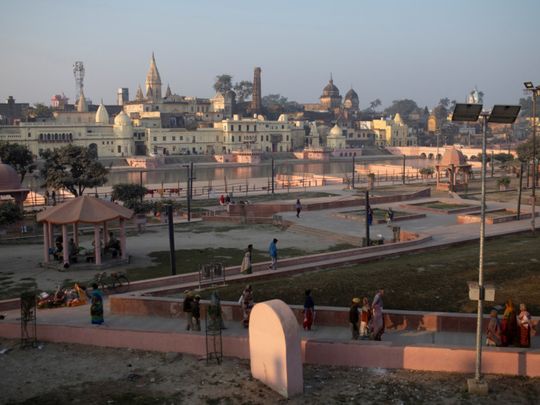
One of the oldest property disputes in the world has come to an end. In a historic judgement, India’s Supreme Court paved the way for the construction of a Ram Temple at the disputed site in Ayodhya and directed the Centre to allot a five-acre alternative plot to the Sunni Waqf Board for building a mosque.
The complex history of India’s Ayodhya case stretches back to antiquity and beyond. And the primary litigant is shrouded in mythology and legitimate questions can be asked of his antecedents.
‘Ram Lalla’ (Infant Ram) is the plaintiff, but none has seen him or asked if he wants to be a complainant to the suit: It forced the court to ask ‘how can a deity be made a juristic person’ and compelled the AIMIM chief Asaduddin Owaisi to comment, “Victory of faith over facts”.
The judgement is 1,045 pages long and it is still too early to debate the lengthy ruling. Yet, there are clear takeaways that are worthy of attention.
Briefly: this was a unanimous judgement by a constitutional bench of five judges. Next, on balance, though the archaeological evidence was more in favour of the Hindus than the Muslims, the Hon’ble judges were categorical in their ruling that a criminal act was carried out in 1992 when the mosque was demolished and also stated explicitly that a wanton act of desecration was committed in 1949 when Hindu idols were placed inside the mosque.
The apex court therefore took recourse to Article 142 to give relief to the Sunni Waqf Board on this account.
Poetic justice indeed: Advani sparked the Ayodhya frenzy, but Vajpayee and Modi went on to become prime ministers of India. It is also worth pondering, should the verdict have gone in favour of the Muslims, how would the Hindus have responded?
The Ayodhya dispute, stretches back more than a century (perhaps even longer) and is one of India’s prickliest court cases and goes to the very heart of its identity politics. Hindus believe that Ayodhya, a city in the northern state of Uttar Pradesh, is the birthplace of one of their most revered deities, Lord Ram.
Muslims say they have worshipped for generation at the mosque that was built during the reign of the Mughal Ruler, Babur. And it was this mosque that was demolished by Hindu mobs in 1992, sparking riots that killed more than 2,000 people. Many Hindus believe that the mosque was actually constructed on the ruins of a Hindu temple that was demolished by Muslim invaders.
If there is one person who has built a career for himself by fostering and harvesting this long-standing grievance, it is none other than L.K. Advani, the senior-most leader of India’s ruling Bharatiya Janata Party (BJP) and the home minister under former prime minister Atal Bihari Vajpayee.
More on Babri mosque dispute
Indeed, Vajpayee distanced himself from Advani, when the latter led the mass movement to build a temple on the site where the mosque stood for more than 450 years.
And ironically, as this historic judgement was delivered, Advani, one of the prime accused in the other Ayodhya case related to the demolition of the Babri Masjid on December 6, 1992, will soon face the verdict from a court in Lucknow for his role in the criminal conspiracy that resulted in the destruction of the mosque.
That said, there were many beneficiaries of that infamous mass movement to build the Ram temple. Advani may have been the linchpin, but Vajpayee himself profited from this movement, so too did the extended family of the Hindu right, the Rashtriya Swayamsevak Sangh and indeed Prime Minister Narendra Modi himself.
“In victory, magnanimity, in peace, goodwill,” Churchill had said, but will India’s Hindus live up to this lofty sentiment? Doubtful, if one is to listen to Advani who, on hearing the judgement, couldn’t resist saying, “It is a moment of fulfilment for me because God had given me an opportunity to make my own humble contribution to the mass movement, the biggest since India’s Freedom Movement.”
Unmistakable hint of triumphalism
He seems to forget that the Supreme Court has unequivocally condemned the demolition of the mosque and whatever he may have mouthed publicly just after the demolition (a half-hearted remorse), there is an unmistakable hint of triumphalism in his utterances now.
India has close to 200 million Muslims, a large percentage of whom feel insecure and increasingly uncertain of their future since the BJP came to power under Modi in 2014. Therefore, some perspective is needed here and to compare this victory to the freedom movement is diabolical. As one who cherished the dream of becoming prime minister, more was expected of him.
Poetic justice indeed: Advani sparked the Ayodhya frenzy, but Vajpayee and Modi went on to become prime ministers of India. It is also worth pondering, should the verdict have gone in favour of the Muslims, how would the Hindus have responded?
Ravi Menon is a Dubai-based writer, working on a series of essays on India and on a public service initiative called India Talks.









